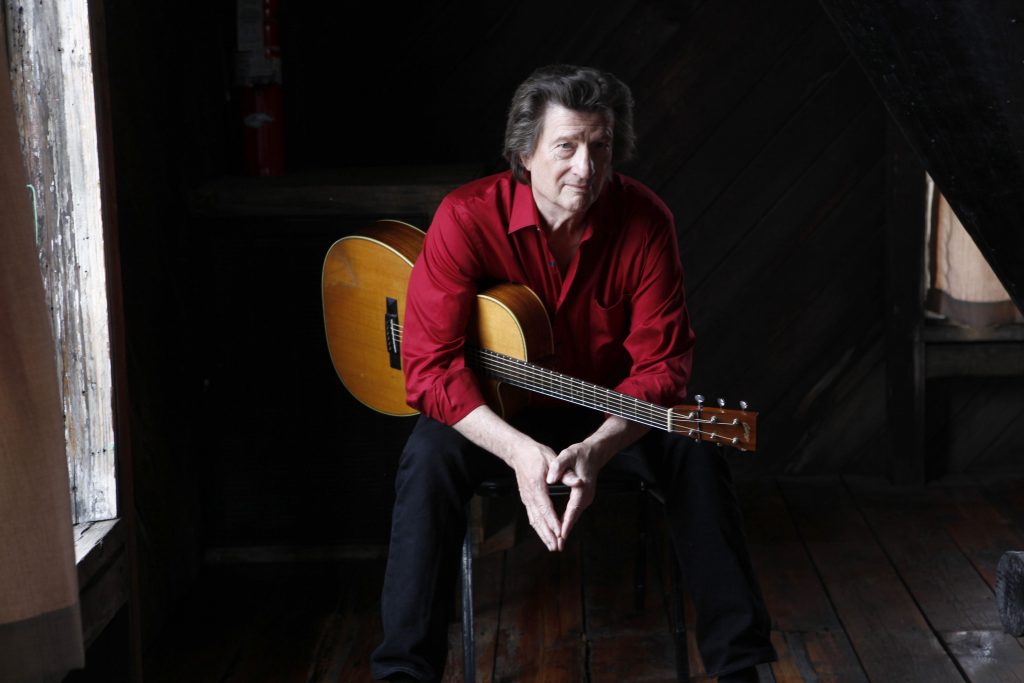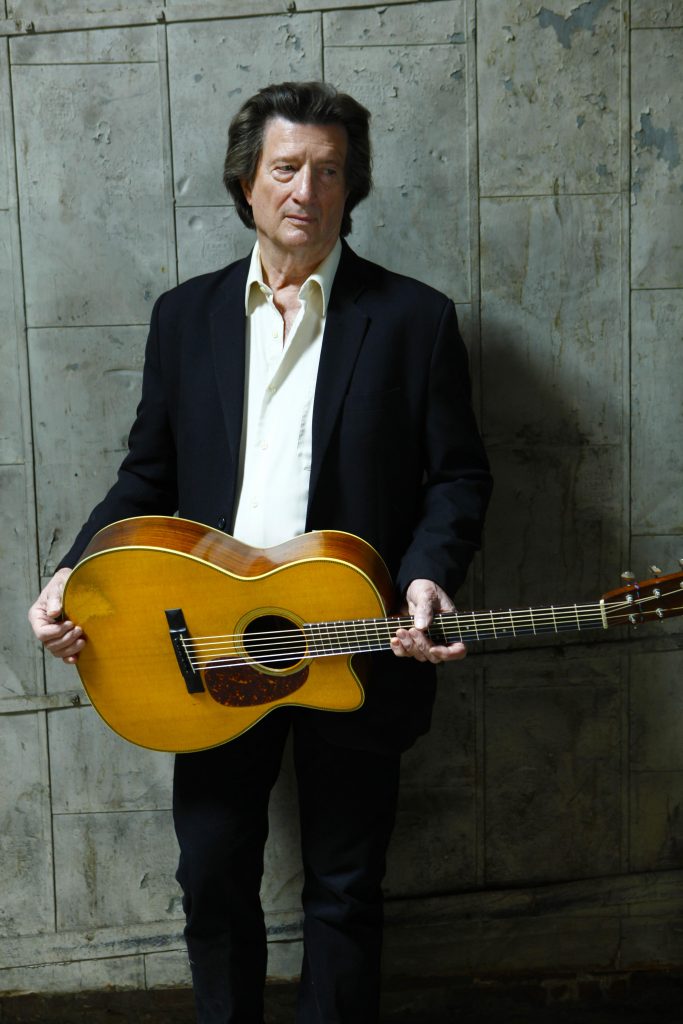Over the course of his more than 40 year career folk and blues guitarist and singer-songwriter Chris Smither has released dozens of albums and hundreds of songs. He was a part of the Cambridge folk music scene in the 1960s where he first got his start and is also a local celebrity now residing in Amherst.
Smither will return to the 2018 Green River Festival in Greenfield this summer on Sunday, July 15 and also recently released his latest record, “Call Me Lucky” through Northampton-based Signature Sounds Recordings. Valley Advocate staff writer Chris Goudreau spoke with Smither about his legacy in music, his songwriting process, and how he put his own twist on a Chuck Berry classic.
Chris Goudreau: First off, I’d like to ask you about your new record, “Call Me Lucky.” What was the recording process like and the inspiration behind that album?
Chris Smither: It was a lot of fun. We recorded at a beautiful place – Blue Rock Studio just southwest of Austin in Texas. It’s like a residence studio … It’s one of those places where all you have to do is work. You just show up. There’s no hassle and beautiful countryside. We were out there for 10 days and we looked up after nine days and we were finished. We spent another day listening. It was one of the best recording experiences I’ve ever had.
Chris G: You’ve recorded a lot of albums over the years. Why did this one really stand out?
Chris Smither: Everyone loved the material. Usually there’s one or two songs that I’m a little uncertain about and I just felt good about all of this stuff. Everybody was clicking together. It was just very smooth. It was kind of a love fest as much as these things can be. Part of it is that I’ve done it so many times there’s not a lot of surprises to the process anymore.
I’m not one of these people who writes songs all the time. I write for projects. I say, ‘Okay, time to make a new record.’ And I realize that I’ve got a little under a year to get the songs figured out and then I start writing. Because they’re all written within the same nine month period, they usually reflect where I’m at in that point in my life.
Chris G: I was really happy to hear that you’re coming back to play Green River Fest. I was wondering if you could talk about your personal experiences playing that festival.
Chris Smither: It’s a great festival and I’ve got a strong personal connection to the guy who puts it together in the first place — Jim Olsen — he runs my record company [Signature Sounds Recordings]. He’s just a great guy to work for. The whole thing is done so professionally. The last time that we played there, we played with the full band — the band that was new on the record back then. It was just a lot of fun. We played after a long session of touring, so everyone was in really good shape. I’m looking forward to it this time.
Chris G: I’m curious to find out about some of your favorite folk or blues artists; some of the people who inspired you to start writing your own music?
Chris Smither: Oh, well. [laughs] I always go back to the two most influential guitar players — Lightnin’ Hopkins and Mississippi John Hurt. For lyricists, I think probably the two biggest ones are Randy Newman; I’d been writing songs before I heard Randy Newman, but he just sort of opened up my eyes to a whole other way of being in terms of a lyricist. Also, Paul Simon is a fabulous lyricist. I just like his sense of how words feel in your mouth as opposed to what they mean. He’s got a beautiful rolling rhythm to his lyricism that I really like.
Chris G: What was your friendship with Eric Von Schmidt like and your early years in your music career in Massachusetts like during the 1960s and 1970s? What was that experience like for you?
Chris Smither: I was a fan of [Eric Von Schmidt] before I ever left New Orleans. I was still living in New Orleans, but a friend of mine lived in Sarasota, Florida, and I was going to school with him. And he said, ‘You know Von Schmidt spends his summers in Florida. We should go see if we can meet him. You can come stay at my house.’ So, we went to Florida during summer vacation and just basically just knocked on his door. That’s how I met him. He was very gracious about it. It was just so incredibly fortunate. He was the one who put the idea in my head that nothing was going to happen for me musically if I stayed in New Orleans. Everything was happening up in New York and Cambridge and that’s where I went. Sure enough, things started happening.
I’ve always felt lucky. Well, there you go. There’s the new record, “Call Me Lucky.” I feel like I’ve been lucky my whole life. I’ve had some bad things happen to me, but on the whole it’s been pretty good.
Chris G: Could you tell me a little bit about your writing process?
Chris Smither: You sit down and you start writing [laughs]. It’s hard to explain that. The process is a big mystery and at the same time it’s almost devastatingly simple. The mystery is where the ideas come from. Everybody that you ever talk to about songwriting will tell you the same thing. They don’t know where it comes from. Having said that, there are ways to make it happen and you learn those. One of the first things that you have to learn is that you don’t write about anything. You don’t sit down to write a song about such and such. You sit down to write a song and it turns out to be about such and such.
Chris G: I know that a lot of your music is influenced by poetry and philosophy to some extent. What has been really influential for you?
Chris Smither: I have a hard time pinpointing that. A lot of people call me a folk philosopher. I don’t really know what to make of that. I do read some philosophy, but I don’t find myself translating that directly into what I write about. Basically, I’m an optimist. I just present things that’ll make them feel better about their lives. It’s not a coherent worldview. I’m just helping people get through.
Chris G: I just wanted to take the opportunity to ask you about your own thoughts about your legacy as a musician?
Chris Smither: If I were to die tomorrow people would probably say, ‘This guy was a great songwriter. He wrote a lot of great songs.’ I think when you study poetry you read about the big poets — the Elliots and all the famous poets you can think of from Milton to Shakespeare. And then, you can take a course on minor poets of the 16th century … I kind of feel like in terms of legacy, that’s where I’ll be. A significant minor songwriter because I’ve never had any big hits, you know. It really makes me happy that a whole lot of people in the business know who I am and are familiar with my name and with my work. Past that, I can’t ask for much more because what I really write for and perform for are the fans. I can’t tell you how many people come up to me at concerts and say, ‘Please, don’t stop what you’re doing.’ It makes me feel good.
Chris G: What are your thoughts about the Pioneer Valley as your adopted hometown?
Chris Smither: I like it. It gets a little bit over the top sometimes in terms of social concerns. I’m basically a dyed in the wool liberal and that shows in the songs as well. It’s really kind of fun. This is the first time in my life that I’ve ever lived in a small town. There’s so much academic life around here.
Chris G: I saw that you covered a Chuck Berry song in a minor key on your latest record. What are your thoughts on covering songs; do you put your own twist on songs?
Chris Smither: You have to find something new there. It’s not just to do the song. Hopefully, you’ll find something no ones found before. That’s what I loved about doing “Maybellene” in the minor key. It changes the whole tone of the song. The song suddenly becomes very dark; not this happy go lucky road happy thing that it was before. I’m a huge fan of Chuck Berry. I just found something there that I don’t think anyone had ever found before.
Chris G: Do you have any favorite songs that you’ve written?
Chris Smither: Oh, well they’re like your children, you know. You’re not supposed to say you have favorite children. There are songs that will always last; that will be there for a long time and there are songs that I’m very fond of because they’ve paid the rent for so long. “Love You Like A Man” has probably made me more money than all the other songs put together. But I like that, and I’ve always loved, “No Love Today” and “Leave the Light On.” “Father’s Day” particularly; I look at that and think that was well written. But I love playing them all. There’s very few of them that I don’t enjoy playing.
For more information about Chris Smither visit https://smither.com
Chris Goudreau can be reached at cgoudreau@valleyadvocate.com.






